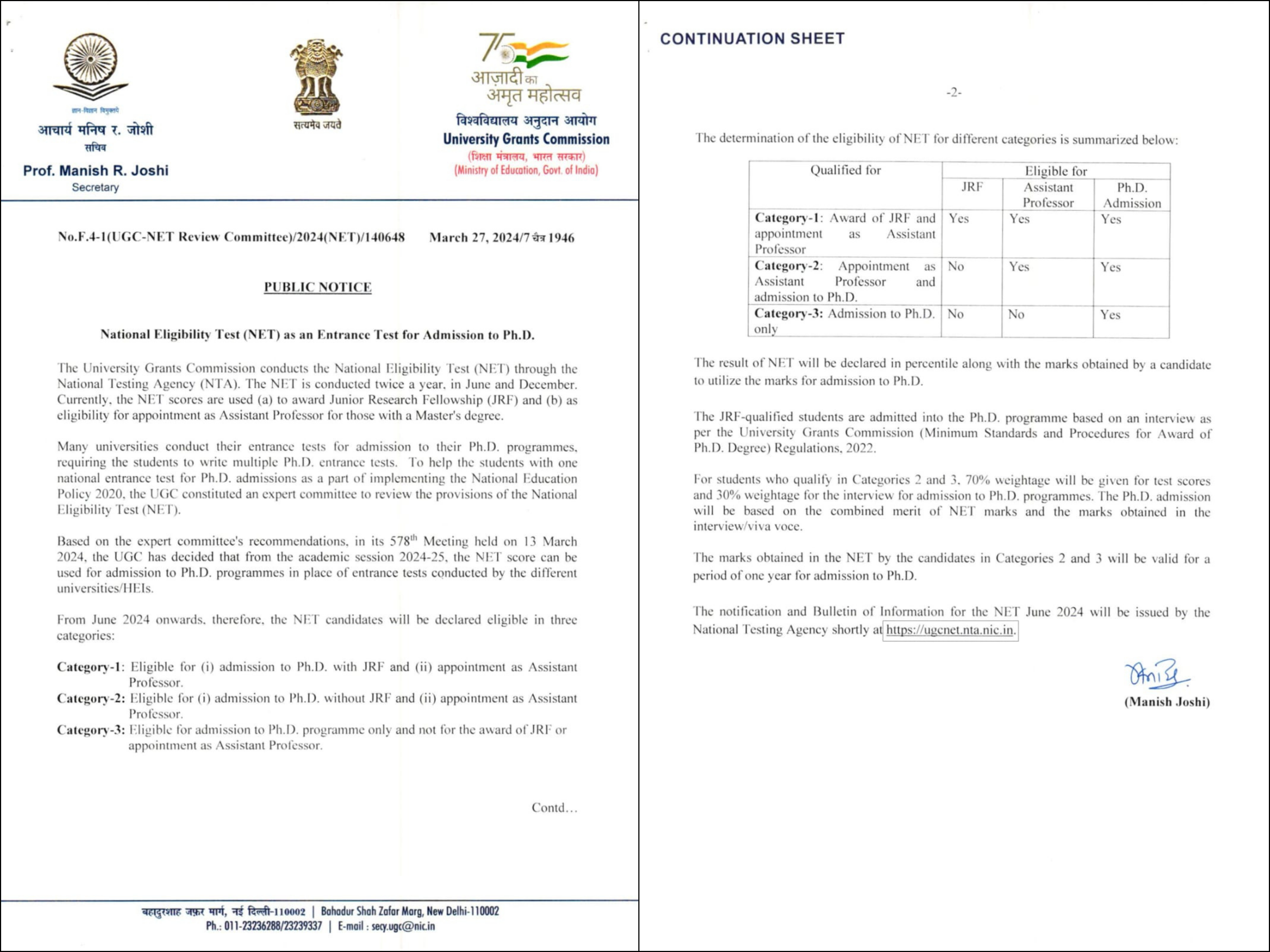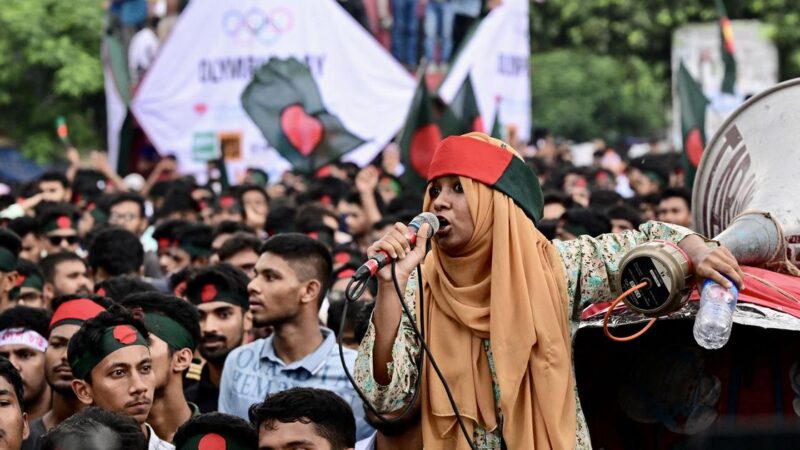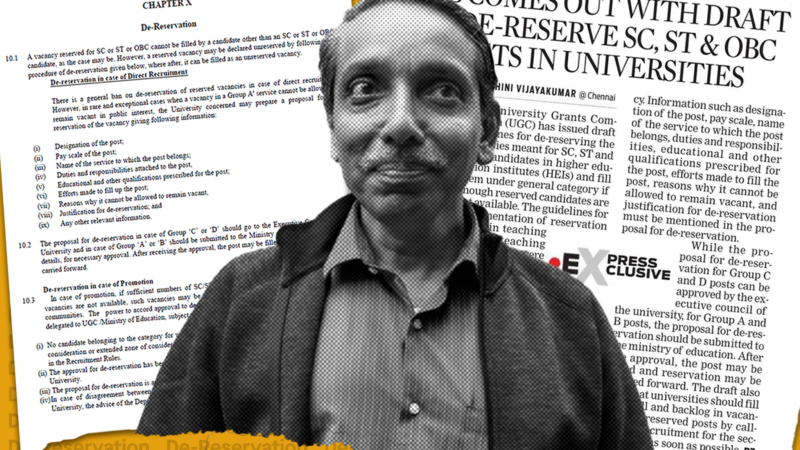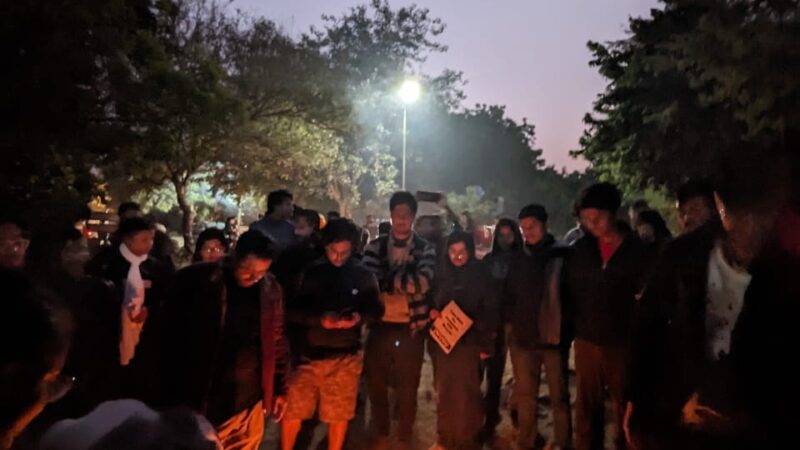UGC’s New Notification: NET as an Entrance Test for Admission to PhD

In a recent notification issued on 27th of March, 2024, UGC has directed all the universities/HEIs to treat the National Eligibility Test (NET) score for admission to PhD programs. This will, in effect, replace all PhD entrance exams of different universities by NET as a single common entrance test. This step by UGC not merely threatens the autonomy of higher education institutions, it will also increase the proportion of overall students being excluded from pursuing research from a public funded university. On one hand, it treats two different exams, NET and PhD entrance, meant for two different purposes as one, on other hand, it indirectly promotes the mushrooming of substandard private institutions offering research programs as expensive commodities by effectively reducing the enrolment of students in public funded institutes.
Treating two different exams meant for two different purposes as one
National Eligibility Test is an eliminatory kind of exam which gives eligibility of being ‘Qualified as Assistant Professorship’ only if a student manages to be in top 6% of those candidate who appeared & obtained minimum qualifying marks , while merely 1% of those are eligible to qualify for ‘JRF & Assistant professorship’. While the number of students appearing for NET has increased each year & students have been demanding to increase the number of fellowship, the percentile of students getting eligibility to qualify has remained stagnant. Currently, many universities are already offering students, who have qualified for NET-JRF, an opportunity to sit for direct interview & based on their research proposal secure admission in PhD programs. But along with this, universities & other higher education institutions had the autonomy of conducting their separate PhD entrance exams in line with their diverse ideas of contributing to research and development in certain field.
Unlike the objective of NET to provide eligibility, PhD entrance exams allowed students to get enrolled in a university after clearing exam and based on their research proposal in interview they could start their journey of research in subjects of their choice even if they had not qualified for NET. Till now, following admission process universities have been bringing their own notifications, specifying the available number of seats in particular research programs. After securing admission, students used to continue to prepare for NET and clear it subsequently. But with the advent of new notification for PhD admission this opportunity is likely to get adversely affected, against the interest of student’s aspiration. It will reduce the enrollment in public funded institutions and limit students from pursuing research.
Systemic destruction of public funded research institutions: Why to hide it Modi Ji?
The new notification issued by UGC introduces three different categories for the purpose of making NET sole entrance exam for PhD admissions. A third category, other than NET & NET-JRF qualified, has been introduced as ‘Admission to PhD alone’. Also, validity of NET qualified certificate has been reduced to 1 year from previous validity of lifetime. For the category of NET & ‘Admission to PhD alone’, 70% weightage has been allotted for test score, while 30% weightage will be given for the interview, showing absolute negligence to the importance of Research Proposal for getting admission in a PhD program. In any standard university, in admission process for PhD programs importance is given to Research Proposals, which reflects the critical engagement & interest of a student in pursuing it, instead of evaluating students on marks obtained through mechanical & rot learning.
Moreover, notification issued by UGC remains absolutely silent on the cut offs or number of students that will be qualified for the PhD admissions. Since the existing percentile getting eligibility of qualifying the NET already remains quite low, it becomes a matter of concern when admission for PhD courses are being bound to NET scores.
Viksit Bharat or Bringing Down Bharat for Young India?
This new step by UGC is another blatant systemic assault on public funded research institutes in Modi regime. On one hand, students are already struggling against seat cuts, fund cuts, for Non-NET fellowship and increase in existing meager amount of fellowships, on other hand, this notification brings a new hindrance in front of students who aspire for higher education by reducing & limiting the opportunity of getting enrolled itself.
Consequences of this new process also entail the serious repercussions of forced choice of private institutions for distressed students, & this in turns serves the basis of mushrooming of private institutions, offering similar courses at higher fees. Students enrolled in private universities will have to bear higher financial burden in absence of scholarships. Policies of the Modi government in its ten years of rule, be it of any sector, has proved how in the name of ‘expert committee recommendation’ it brings out new plans that systematically attempts to bulldoze public services and paves the path for corporate expansion in those sectors.
Students across the country have been continuously raising their voice to increase the investment in research & development sector to expand the indigenous research base of the country. Contrary to it, Modi government has not merely neglected these demands but also kept on deteriorating the conditions of public funded institutions through such anti-student policies that only favors the corporate greed for profit over the needs of common students in long run.
Assault on academic autonomy in a country as diverse as India!
Since the arrival of Modi government, assault on public education has increased sharply through continuous curtailment of autonomy that is expected to be given to public universities for carrying out researchs in line with their diverse ideas, in different regions, encompassing diverse cultural & linguistic identities. This while process can be summed up in 3 Cs: Centralization, Control, & Culling! Centralization of whole decision making process of Indian education by ignoring the concerns & voices of various stakeholders, such as student community and state governments. Control over higher education by curtailing the academic freedom, & culling the prospects & aspirations of students by destroying the public funded research institutions & limiting the opportunity to pursue it.





